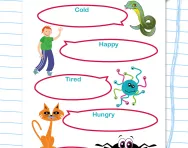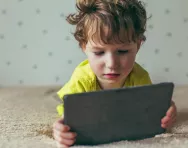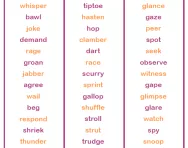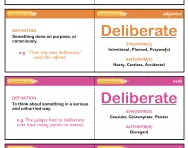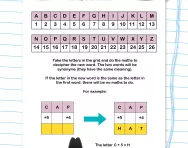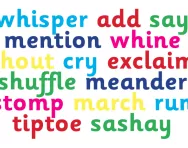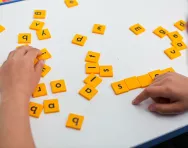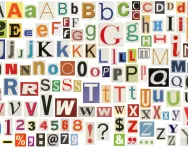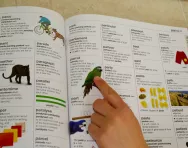Important update from TheSchoolRun
For the past 13 years, TheSchoolRun has been run by a small team of mums working from home, dedicated to providing quality educational resources to primary school parents. Unfortunately, rising supplier costs and falling revenue have made it impossible for us to continue operating, and we’ve had to make the difficult decision to close. The good news: We’ve arranged for another educational provider to take over many of our resources. These will be hosted on a new portal, where the content will be updated and expanded to support your child’s learning.
What this means for subscribers:
- Your subscription is still active, and for now, you can keep using the website as normal — just log in with your usual details to access all our articles and resources*.
- In a few months, all resources will move to the new portal. You’ll continue to have access there until your subscription ends. We’ll send you full details nearer the time.
- As a thank you for your support, we’ll also be sending you 16 primary school eBooks (worth £108.84) to download and keep.
A few changes to be aware of:
- The Learning Journey weekly email has ended, but your child’s plan will still be updated on your dashboard each Monday. Just log in to see the recommended worksheets.
- The 11+ weekly emails have now ended. We sent you all the remaining emails in the series at the end of March — please check your inbox (and spam folder) if you haven’t seen them. You can also follow the full programme here: 11+ Learning Journey.
If you have any questions, please contact us at [email protected]. Thank you for being part of our journey it’s been a privilege to support your family’s learning.
*If you need to reset your password, it will still work as usual. Please check your spam folder if the reset email doesn’t appear in your inbox.
What are synonyms and antonyms?
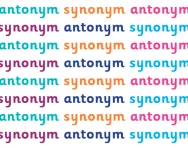
What is a synonym?
Synonyms are words with the same or similar meanings. For example: 'joyful' is a synonym for 'happy'.
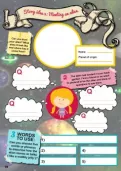
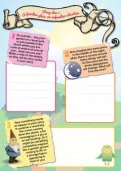
Download a FREE Creative Writing toolkit!
- KS1 & KS2 workbooks
- Bursting with fill-in prompt sheets and inspiring ideas
- Story structure tips, style guides and editing suggestions
What is an antonym?
Words with opposite meanings are called antonyms. For example: 'miserable' is an antonym of 'happy'.
How are synonyms and antonyms taught in primary school?
Throughout their time at primary school, children will be encouraged to think of more interesting words to replace 'boring' adjectives such as 'happy,' 'sad' and 'scared.'
It is really important that their vocabulary widens rapidly, so that they are able to make their writing as rich and engaging as possible.
Knowing plenty of synonyms for common words is a big part of this.
For example, if a child wants to write that a character in their story is scared, their writing will be make much more of an impact if they run through a list of words similar to scared and then decide on the one they think works the best, such as terrified, anxious, petrified, apprehensive, fearful, jittery, nervous.
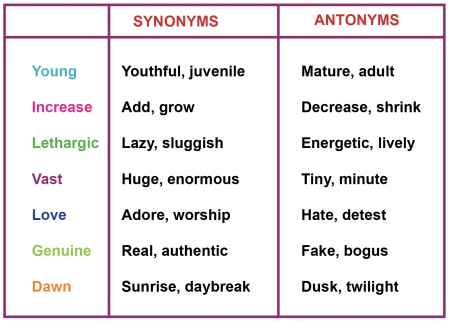
As outlined in the national curriculum (revised in 2014), children in Year 6 learn the term 'synonym' and what it means.
Teachers encourage this expansion of vocabulary in the following ways:
- Providing children with laminated word banks on their tables. Children may be given a lists of synonyms to support them in improving their writing; for example, they may have a list of words that could be used instead of 'said' such as: whispered, shouted, screamed, replied, babbled, agreed, boasted.
- As a class, compiling lists of interesting vocabulary and making it part of the class display so children are constantly exposed to good vocabulary. For example: a teacher might have a list of words similar but more interesting than 'walked', such as: trudged, scuttled, scurried, stomped, sprinted, tiptoed.
- Giving children a thesaurus (a dictionary of synonyms and antonyms) in which to look up words to improve their vocabulary. Teachers may give children this activity to do after they have completed a piece of writing. They may ask them to go through and underline all the adjectives and then look up alternative, better words for these adjectives.
- Word activities, where children are given word cards with various groups of synonyms which they have to put into groups according to meaning.
The more children are exposed to a good range of vocabulary the more likely they are to use it in their writing on a regular basis.
Synonyms and antonyms in verbal reasoning
Finding synonyms and antonyms of words is part of verbal reasoning and children taking the 11+ exam are likely to be asked to work out lists of specific synonyms and antonyms in Cloze-test-style question types.


